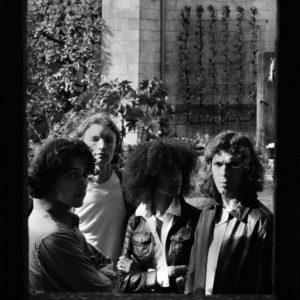
St. Vincent’s eponymous fourth album has been hotly anticipated by, well, everyone, for quite some time now, and it does not disappoint. 31-year-old Annie Clark, with her Tim Burton-character hair and doe eyes, has been making music that somehow manages to be infectiously curious and unflinchingly disturbing since the mid-aughts, but it seems she has finally brewed the proper potion of timing, hype, experience and irrepressible talent to solidify her crossover into mainstream success.
Clark spent much of the last year touring for Love This Giant, the album she recorded with David Byrne, and has since set the Internet aflame with two singles, the coolly manic “Birth in Reverse,” and “Digital Witness,” a horn-heavy inquisition of life as told by Instagram.
Clark has a well-documented backstory to St. Vincent‘s first track, “Rattlesnake.” It’s an apt introduction to the album, starting with trademark digital horns and lyrics that place Clark running naked alongside power lines. She’s alone in the desert, having just come face-to-face with a poisonous snake. She patters a procession of “ah-ah-ahs,” taking a break to sing, “The only sound out here is my own breath.” A sonic wonderland builds, filled with video-game pings, lasers and fuzzy guitar. It’s as if she’s starring in a sequel to Thelma and Louise where the murderesses throttle themselves into outer space and meet up with David Bowie. It’s fierce and fearless and wacky.
Clark’s vocal rhythms add energy to her songs that seems spontaneous and unforced, and yet all of the songs maintain a robotic quality. She is known for her electrifying live shows, but the video for “Witness” shows factory workers marching in pastel uniforms. The album cover has her perching on a throne, dazzling in a metallic dress with her electrocuted hair, offering an unforgiving gaze, lifting one eyebrow ever so slightly. She rules over a dark fairytale world.
“Prince Johnny” comes out of this mode. It’s St. Vincent’s version of a folk song, where Clark assumes the role of a scorned-lover-turned-wizened storyteller. The title character is a playboy who wants to be a “son of someone,” but also “a real boy.” The storyteller tries to be unsympathetic, but ultimately admits her own wish to be a real girl, too.
“Huey Newton” continues to blur the lines between reality and dark Disney nightmares, juxtaposing “fake knives, real ketchup” and “cut throats.” Some of the most exciting moments in the album are when Clark conjures these zany, intense, vivid dreams. “Bring Me Your Loves,” “Psychopath” and “Severed Crossed Fingers” similarly leave you begging for more intensity, more blurriness, more vicious and otherworldly creatures.
Which makes some of the simpler songs curious oddities. “I Prefer Your Love” is a straight up power pop ballad. It’s got a cheeky refrain, sure — “I prefer your love / to Jesus” — but it wouldn’t be hard to imagine Lady Gaga singing it. It’s followed by “Regret,” which sees the return of the fuzzy guitar but is mostly a fresh, melodic pop song with slightly foreboding lyrics. It is the most accessible song on St. Vincent’s most accessible album, which isn’t a bad thing. “Witness” and “Birth” are in a similar vein, while offering interesting commentary on technology and domesticity.
St. Vincent alternates between unpretentiously charming and intimidatingly good. It’s easy to see why Byrne picked Clark as his protégé. Adding together musical knowledge, experimental guts, and the ability to inject playfulness alongside pure female power, she is a deserving inheritor to the Talking Heads legacy. No offense to Dave Longstreth, but Annie Clark is, frankly, more appealing and more necessarily frightening. All the better that she simply assumed her throne. Nobody had to give it to her.
Review by Melanie Broder. Follow her on Twitter @melbroder.
St. Vincent’s US tour kicks off this Wednesday in NYC at Terminal 5.










